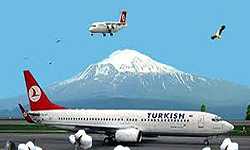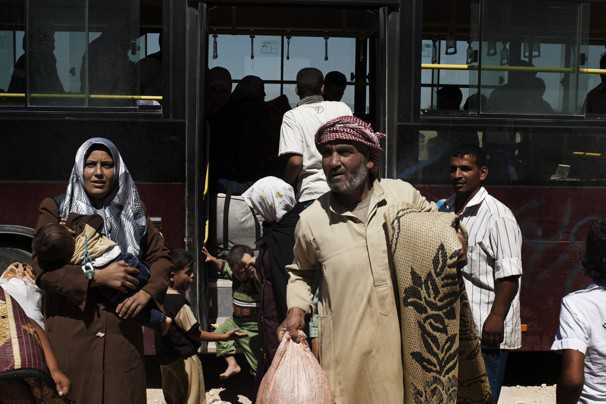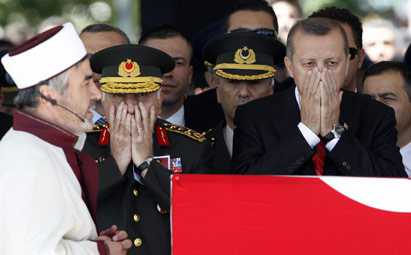
Contrary to what the Western mainstream media portray, the armed militias in Syria are not fighting for democracy or freedom on behalf of the Syrian people. Indeed, credible sources report that the Syrian population is living under a reign of terror imposed by these militias, which have resorted to massacring villages, public beheadings, no-warning car bombs that even target funerals, kidnapping of families, attacking hospitals and news broadcasters, and turning mosques and churches into sniper posts.”
Before taking up a career in politics, Turkey’s Prime Minister Recep Tayyip Erdogan was known in his younger days as a semi-professional soccer player. Now, it seems, his erstwhile footballing skills are letting him down badly as he scores one own-goal after another on the political field.
The 58-year-old Turkish leader this week denounced his former personal friend, Syria’s President Bashar al-Assad, as a “terrorist.”
Erdogan told a gathering of his ruling Justice and Development Party: “The regime in Syria has now become a terrorist state.” Recently, the Turkish premier also declared that President Assad had “lost all legitimacy” and therefore “must go.”
However, on every issue, Erdogan’s fiery words and actions have a knack of rebounding with self-inflicted damage to his own integrity and that of his government.
Ironically, at the same time that Erdogan was denouncing Syria as a “terrorist state,” some 400 members of the self-styled Free Syrian Army were gathering in Turkey’s Hatay Province for a three-day summit. The agenda? How to sharpen their campaign of terror on Syria to overthrow the government in Damascus.
For the past 17 months, the Turkish government and military have been brazenly assisting the armed militias waging a foreign-backed covert war of aggression against the neighboring Syrian state and people.
Turkey has provided the criminal war effort with land bases, logistics and surveillance, personnel training and weapons, including anti-aircraft missiles, according to recent reports.
Contrary to what the Western mainstream media portray, the armed militias in Syria are not fighting for democracy or freedom on behalf of the Syrian people. Indeed, credible sources report that the Syrian population is living under a reign of terror imposed by these militias, which have resorted to massacring villages, public beheadings, no-warning car bombs that even target funerals, kidnapping of families, attacking hospitals and news broadcasters, and turning mosques and churches into sniper posts.
The so-called Free Syrian Army, which is now reportedly re-branding itself as the Syrian National Army in part to distance itself from these atrocities, may include nationals and defectors, such as the former general Mohammed al-Haj Ali and colonel Riad al-Asaad, but the ranks are brimming with mercenaries from several countries affiliated with Western and Saudi-backed Sunni extremists, such as the Libyan Islamic Fighting Group and the mercurial al-Qaeda.
The Syrian government claims that the country is the victim of a foreign conspiracy of destabilization and regime change [which] are, as the evidence shows, factually correct.
This means that Turkey and its NATO allies, the US, Britain, France and Germany, along with the Saudi, Qatari and Israeli arms suppliers, are co-conspirators in an unprovoked, criminal war of aggression against a sovereign state. In short, state terrorism.
Recep Tayyip Erdogan, for one, therefore stands accused of having very serious blood on his hands. He is liable to face charges of state terrorism and complicity in causing the deaths of thousands of civilians. In this light, his excoriation of Syria’s Assad sounds rather more like the words of a man who is talking into a mirror.
But Erdogan’s own-goals are rebounding in other ways too. His treacherous subversion against Syria is provoking a public backlash within Turkey against his ruling party. Polls and protests show that the Turkish people are deeply opposed to Erdogan’s neo-Ottomanism. His former popularity is melting rapidly like snow in spring as the Turkish Labor Party and other opposition parties condemn the Ankara government for “engaging in terrorism.”
The terrorism that Erdogan and his planners are unleashing in Syria is recoiling with a refugee crisis that is placing an acute strain on Turkish economic resources. The UN says that the numbers fleeing to Turkey may soon reach 200,000. These people are fleeing from violence that Erdogan is in part personally responsible for. The frustration voiced by the premier and his foreign minister, Ahmet Davutoglu, over the lack of action from the US, France and Britain to back “safe havens” for refugees in Syria is a sign that Erdogan fears that his supposed Western allies are conniving to dump that humanitarian crisis on Turkey. His fears on that score are very real given the duplicitous track record of these powers.
A further rebounding problem is the resurgence in Turkey’s decades-long battle with Kurdish separatists in the PKK. In recent weeks, the death toll among Turkish troops has steadily increased in line with guerrilla attacks as the PKK takes advantage of the cross-border chaos engendered by Erdogan. Turkey’s Kurdish problem threatens to once again flare up into a full-blown war after years of smoldering out of sight. The PKK may be labeled as “terrorists” by the US State Department, but Turkish governments down through the decades stand accused themselves of terrorism and genocidal policy against the Kurdish people living in the southeastern provinces.
Some 40,000 people are estimated to have died in the Turkish state’s internal terror campaign against the Kurds since the 1970s, a campaign that has involved aerial bombing of villages, scorched-earth tactics and displacement of over three million people. This murderous state repression is a major reason why the European Union has for years balked at admitting membership to Ankara. This long sought-after goal for Turkey’s political and business classes is probably made all the more remote in the wake of the Erdogan government’s machinations in Syria with its repercussions of reopening Kurdish wounds.
But perhaps the final match-loser for Erdogan from his recent tirade against Syria as “a terrorist state” is the unwelcome reminder that those words provoke concerning Turkey’s own nefarious history of genocides, not only against Kurds, but also against Armenians, Assyrians and Greeks. These are genocides that occurred less than a hundred years ago, with death tolls that reach into the millions and recall grainy images of appalling human suffering from death marches and starvation. To this day, the Turkish authorities deny that the genocides ever took place and would prefer that the world did not mention such heinous events. But one paradox from Turkey’s self-serving intervention in Syria is that the world is being reminded of Turkey’s own dark, terroristic past.
Ironically, before his back-stabbing escapades over Syria, Recep Tayyip Erdogan had gained much goodwill among ordinary people and governments across the Middle East and beyond as an honest broker with regard to Iran and the Palestinian plight. Now, that popular goodwill seems to have all but vanished as Erdogan sinks more and more into schemes of treachery and state terrorism.
The Turkish footballer-turned-politician may live to rue the day when international public opinion finally gives him the red card for foul play.




